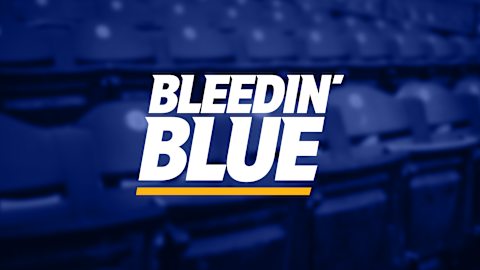St. Louis Blues: On The Seventh Day Of Bluesmas 2020


On the seventh day of Bluesmas, our true love gave to us – seven number sevens remembered fondly by St. Louis Blues fans
On the seventh day of Bluesmas, we take a look at seven number sevens to wear the Note for the St. Louis Blues. There have been more, but seven turned into greats or at least hometown heroes.
The argument for best number seven usually revolves around Red Berenson and Garry Unger. Much of that depends on how old you were when you first got into the Blues, or even if you’ve been around for the entire length of the franchise.
Red Berenson
The older you are, the more you’ll lean Berenson’s way. Berenson has that edge in terms of leadership and also just a titan in the game itself.
Berenson played 17 years in the NHL, eight of which were spent with the Blues. Those eight were split into two, seperate, four-year stints with a side trip to Detroit in between.
The Red Baron would score 261 goals and 658 points in his career. 172 of the goals and 412 of the points came with the Blues.
Like another famous Blues player, Bernie Federko, Berenson was shockingly traded for a younger player that would prove to be an upgrade overall. Still, it was shocking at the time. Coincidentally, both Berenson and Federko were sent to Detroit.
Berenson also gets put higher on the list for some Blues fans because of his influence on the franchise. He was team captain for awhile and would return as the team’s coach from 1979 through 1982.
Playing with the Blues suited Berenson very well. His career highs in goals and points came while wearing a Blues jersey. When he was faltering in Detroit, being traded back to St. Louis rejuvenated him and he was a solid contributor for another four seasons before retiring as a player in 1978.
Berenson would go onto greater coaching heights with another blue and yellow team, the University of Michigan.

Garry Unger
For the slightly younger crowd, and those who only look at numbers, Unger is your man. Unger had more goals with the Blues alone than Berenson had in his entire career.
Unger was nicknamed the Iron Man because he playe 914 games straight without missing one. The only reason his streak ended was because the coach of the Atlanta Flames decided to bench him.
Unger ended his Blues career with 292 goals and 575 points. Over his entire career he had 413 goals and 804 points.
It’s interesting that the Red Wings would trade Unger. He was trending upward over the past two seasons with Detroit.
I guess they feared regression when he had only scored 13 goals through 51 games in the season he was traded. Detroit’s loss was the Blues gain.
Unger scored 70 points in his first, full season with the Blues. He scored 80 points the year after that (1974-75) and would score 80-plus points two more times with the Blues.
Even in his down years, he still scored more than 30 goals. In fact, Unger never scored fewer than 30 goals with the Blues when he played a full season.
Despite his skills waining in the NHL, Unger never lost his touch overall. After leaving North America, he played a few seasons in England and managed a whopping 95 goals and 200 points in 30 games one season.
Still, it was his iron will to stay on the ice that endeared him to Blues fans. While he loved the game and had a pain threshold unlike many others, it was a family situation that gave him extra motivation to push through.

Cliff Ronning
Cliff Ronning is one of those players that is somewhat the opposite of our previous entries. Ronning was a pretty good player with the Blues, but went on to better things elsewhere.
The Blues drafted Ronning in the seventh round in 1984, so he wasn’t expected to do too much. However, in his first half season he scored 11 goals and 25 points, which is not too bad for a seventh rounder.
Ronning only played 26 games the following year, but jumped up to 69 games in his third pro season. He ended that year with a rather nice 55 points and 24 goals.
Then, Ron Caron did what he does and that was make trades. Ronning was included in one of the worst trades in Blues history. Ronning, Robert Dirk, Sergio Momesso and Geoff Courtnall were all traded for Garth Butcher and Dan Quinn. Blues fans love Butcher, but St. Louis gave up a lot of goals and points.
Ronning had a 70 point season his very first year in Vancouver. He scored 85 points after that and then eight out of the next nine seasons were all over 50 points. The only season he failed to do that was during the lockout and half the games were played.
Ronning was not an all-world type player, but the Blues could have used some of those points. Nevertheless, Ronning was a solid number seven even in his days with the Blues.

Nelson Emerson
Nelson Emerson is another in a similar category to Ronning. Emerson had a decent Blues career, but went on to bigger things with other teams.
Emerson had expectations though. He was a third-round draft choice a year after Ronning, in 1985.
Emerson’s first toe dip in the NHL was not that great, but we won’t count that sine he was actually wearing the number 32. He took over the number once Ronning left.
The digit immediately suited him. Emerson scored 23 and 22 goals his first full two years.
His first full season in the NHL, he scored 59 points. He shot up to 73 points in the 1992-93 season.
Emerson helped contribute in that playoff season too. He managed seven points in 11 playoff games.
At least Emerson’s trade was a little more understandable. The Blues traded Emerson and Stephane Quintal for Phil Housley.
Housley was an All-Star defender. He was also part of the trade that acquired Al MacInnis, so in the long run Emerson for MacInnis is pretty solid trade for the Blues.

Joe Mullen
Joe Mullen has an interesting story. Despite a stellar college career, Mullen went undrafted because he was small and American and not from a traditional hockey producing market.
The Blues took a chance on him and it ended up paying off. In a twist of history, Mullen actually gave up an opportunity to be on the 1980 Miracle on Ice team to turn pro. That clearly helped his bank account, but it would have been interesting to see him on that team.
For whatever reason, Mullen was still somewhat held back when he came to the Blues. He played just over half a season in both years, but still scored 59 points his rookie season.
In his first full season with the Blues, Mullen racked up 41 goals and 85 points. The following season, he got up to 92 points with 40 goals.
Mullen was on his way to being a star for the Blues. Then, the Blues do what they do.
Ownership was in flux and the payroll needed to be trimmed. Mullen was shipped to Calgary.
Despite the fact Mullen was over halfway to another 90-plus point season, the Blues traded him off. They sent him, Terry Johnson and Rik Wilson for Eddy Beers, Charles Bourgeois and Gino Cavallini.
Cavallini was a fun player, but that’s not a replacement for Mullen. Mullen went on to three-straight more seasons of 40 or more goals and had a 113 point season in there as well.
The only positive thing about that trade was that it somewhat greased the tracks for the eventual Brett Hull trade a couple years later. Other than that, the Blues lost out on a Hall of Fame player.

Keith Tkachuk
Keith Tkachuk was a star player by the time the Blues acquired him. He had a great career with Winnipeg/Phoenix before the Blues picked him up.
If you haven’t picked up a pattern here, just about all the number sevens either went on to bigger things or did just as many great things with other teams before they arrived. At least with Tkachuk, the Blues got nearly half his production.
Tkachuk ended his career with 1065 points and 538 goals. 208 goals and 427 points came with the Blues, which is not too shabby.
Tkachuck was regularly in the top six forwards. Even as he aged, Tkachuk was still pretty consistent.
The Blues missed out on the 50-goal seasons, but Tkachuk was still a good offensive force. He was one of the last true power forwards that had the talent to snipe goals but also park the bus in front of the net.
The thing that sucked for Tkachuk was that he came in right after the Blues made the Western Conference Final, so he missed out on that. While he played on some successful teams in St. Louis, the ownership went into flux during his time as well and players were sold/traded off.
Still, Tkachuk felt loyalty to the team and the city. Even after being traded to the Atlanta Thrashers, Tkachuk came back for three more seasons before retiring in 2010.
Beyond just being a player for the Blues, Tkachuk helped out the St. Louis hockey scene. He was a youth coach for awhile, in addition to being a scout for the Blues. Now, he has two sons in the NHL. Perhaps years down the road, they will become Blues too. Maybe even be the next great number 7.

Pat Maroon
Last, but not least, we come to Pat Maroon. Maroon was a local product, growing up in Oakville.
He went to play junior hockey down in Texarkana before that franchise was moved to St. Louis and became the St. Louis Bandits. Maroon would only spend one season with the Bandits in Chesterfield, but he was a star player on a Robertson Cup championship team.
Maroon wore the number seven with the Bandits, so it was fitting that he would take that number in his one and only season with the Blues.
In terms of production, Maroon was nothing to write home about. He only scored 10 goals and had 28 points with the Blues.
However, he was a role player and he played his role to perfection. Like Steve Ott and Ryan Reaves before him, Maroon was brought in to be a big body and an agitator.
That was never more evident than during the Western Conference Final and Stanley Cup Final. Maroon got under everyone’s skin that he needed to.
The scene where he looked over at an opposing player and yelled “you guys are f***ed” will go down in Blues legend.
In addition to all that, Maroon scored the game-winning, series-ending goal against the Dallas Stars to put the Blues into the Western Conference Final. As an NHL player, Maroon was not known for a ton of offense, but he came up with one of the biggest goals in team history when he scored on Robert Thomas‘ rebound.
Next. On the sixth day of Bluesmas. dark
Down the line, some might question how a player who spent one season in St. Louis can be considered one of the best number sevens. When you have gigantic moments like that in a Stanley Cup winning year, plus the fact you came back home to play for your boyhood team, then that gives you all the extra points you need to make this list.